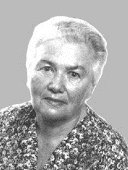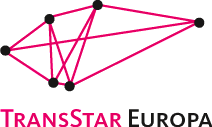 Anna-Halja Horbach (2 March 1924 – 11 June 2011)
Anna-Halja Horbach (2 March 1924 – 11 June 2011)
Anna-Halja Horbach was born March 2nd 1924 in the Bukovinian village of Brodina as the daughter of Nikolai and Mariia Lucjak. She was raised in the Southern Bukovinian Carpathians and visited secondary school (Gymnasium) in Czernowitz. At home she spoke Ukrainian and at school Romanian. Austrian ancestry on her mother’s side enabled her family to resettle in Germany in 1939 within the framework of the “Back Home into the Empire” (Heim ins Reich), where she settled in the Westphalian city of Paderborn. There she received her general university entrance qualification (Abitur) and eventually moved to Göttingen, where she started her studies in philology and met her future husband, the Slavist Olexa Horbach. In 1950 she received her doctorate degree in Munich with her thesis on “Epic Stylistic Devices of the Cossack Dumas”. The married couple then moved to Frankfurt/Main in 1959 where Olexa Horbach was appointed Professor in Ordinary for Slavic Language Studies.
Already early on Anna-Halja Horbach began to work on literary translations. Her publication list includes almost all names of 19th and particularly 20th century Ukrainian literature. With her work, Anna-Halja Horbach transports Ukrainian culture and literature to Germany: via paths of acknowledgement between the Russian and Polish literatures before 1900; via the flourishing after 1900; via the renewed oppression after 1930 and especially again after 1945; via the relenting commitment towards her own peoples and the own culture in the last decades of the Soviet regime. She also dealt with Chernobyl in her work; primarily however with the fate of dissidents and their wives via the Ukrainian prison camp literature, which was eclipsed by Russian prison camp literature.
Her ambition to introduce the German reader to Ukrainian literature was exacerbated by the political tendency in the 1960s and 70s when the Soviet Republic of Ukraine became synonymous with Russia and in general did not arouse any interest in Germany. Anna-Halja Horbach nonetheless succeeded in publishing over 50 anthologies, amongst others: „Blauer November“ [Blue November] (1959); „Fata Morgana“ [Fata Morgana] (1962); „Räubersommer“ [Summer of Thieves] (1968); „Ein Brunnen für Durstige“ [A Well for the Thirsty] (1970); „Ukrainische Waldmärchen“ [Ukrainian Forest Tales] (1965); „Wilde Steppe. Abenteuer. Kosakengeschichten“ [Wild Steppe. Adventure. Cossack Stories] (1974); „Stimmen aus Tschernobyl“ [Voices from Chernobyl] (1996), „Ein Rosenbrunnen: Junge Erzähler aus der Ukraine“ [Rose Fountain: Young Ukrainian Narrators] (an anthology of young authors with texts by B. Zholdak, J. Andrukhovych, O. Ulyanenko, 1998), „Die Kürbisfürstin“ [Pumpkin Princess] (1999), „Die Stimme des Grasses“ [Voice of the Grass] (2000). She dedicated her translation interests not only to the classical works of Ukrainian literature („Die Schatten vergessener Vorfahren“ [Shadows of Forgotten Ancestors], „Fata Morgana“ [Fata Morgana] by M. Kotsiubynsky, „Steinseele“ [Soul of Stone] by H. Khotkevych, „Marusja“ [Marusia] by M. Vovchok, „Schwarzer Rat“ [Black Council] by P. Kulish), but also to the works of modern authors. All of these works belong to different genres and styles and represent the diversity of Ukrainian culture, whereby they considerably contribute to European literature and simultaneously spark the interest of the modern German reader.
As a translator and editor of Ukrainian literature she always wanted to remain authentic, which is the reason why she got in direct contact with contemporary authors, literary critics and translators. These contacts she successfully utilized as she founded her own publishing company in 1995, naming it Brodina Verlag after her hometown. At this publishing company primarily translations of contemporary Ukrainian poets and writers of prose were published, some of them in two languages. At her publishing company the first German translation of texts by Yury Andrukhovych, Lina Kostenko, Ihor Rymaruk, Victor Kordun, Valerii Shevchuk were published. Amongst the most important books which were published by her publising company is the German-Ukrainian reader titled “Die ukrainische Literatur entdecken” [Discovering Ukrainian Literature] (2001) which presents the most important works of Ukrainian literature as well as the book „Die Ukraine im Spiegel ihrer Literatur“ [Ukraine in View of its Literature] (2002) which illustrates interesting aspects of Ukrainian-German contacts.
In addition to her literary translation activities, Anna-Halja Horbach continued to pursue her interests with respect to literary studies. She primarily dealt with issues concerning German-Ukrainian literary relations in Bukovina (Leopold von Sacher-Masoch, Olha Kobylianska and others). She also wrote a number of texts on the works of Ukrainian authors for the Kindler’s Literature Encyclopaedia.
For her activities she was awarded the Cross of the Order of Merit in 2006 by Köhler, President Federal Republic of Germany. The Ukrainian state also acknowledged her dedication to Ukrainian culture with a number of medals and certificates. She was honorary chairperson of the German-Ukrainian Association Rhein-Neckar as well as corresponding member of the T. Shevchenko Association of Sciences.
Dr. Maria Ivanytska, Julija Mykytyuk, Olga-Daryna Drachuk
Relying on the structure and methodology of classical and postclassical [...]
For further information on translation, the TransStar project and the [...]
Relying on the structure and methodology of classical and postclassical [...]
Sir or Madam, In co-operation with KulturKontakt Austria, the Austrian [...]
Five short films with translations (videopoetry) were made as part [...]
Translating Cube: Six Sides of European Literature and Translation Berlin, [...]
Programme (PDF)
Five short films with translations (videopoetry) were made as part [...]
Translating Cube: Six Sides of European Literature and Translation Berlin, [...]
Programme (PDF)
Translating Cube in Tübingen Reinold Hermanns: SWR2 Journal am Mittag, [...]
Being Exchanged: Between Paris, Stuttgart and Ivano-Frankivsk Yuri Andrukhovytsh, Lubomír [...]
Five short films with translations (videopoetry) were made as part [...]
Bookstore: http://www.edition-fototapeta.eu/geschichten-erzaehlen
More here (PDF). Bookstore: https://knjigarna.ff.uni-lj.si/si/izdelek/1623/pet-poti-do-prevoda/
Five short films with translations (videopoetry) were made as part [...]
Bookstore: http://www.edition-fototapeta.eu/geschichten-erzaehlen
More here (PDF). Bookstore: https://knjigarna.ff.uni-lj.si/si/izdelek/1623/pet-poti-do-prevoda/
Translating Cube: Six Sides of European Literature and Translation Berlin, [...]
Programme (PDF)


